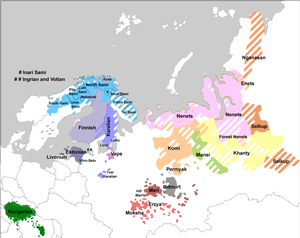Mordvinic languages
| Mordvinic | |
|---|---|
| Geographic distribution | Southwestern and Southeastern Russia |
| Linguistic classification | Uralic
|
| Subdivisions | |
| Language codes | |
| ISO 639-2 / 5 | fiu |
The Mordvinic languages [1] are a subgroup of the Uralic languages, comprising the closely related Erzya language and Moksha language.[2] Previously considered a single "Mordvin language",[3] it is now treated as a small language family. Due to differences in phonology, lexicon and grammar, Erzya and Moksha are not mutually intelligible, to the extent that Russian language is often used for the intergroup communications. [4]
Both Mordvinic languages also have their own literary forms. The Erzya literary language was created in 1922 and the Mokshan in 1923. [5]
Other names for the group are Mordvinian languages, (Russian: Mordovskie yazyki), the official Russian term for the language pair [6] and Mordvin languages [7].
Phonological differences between the two languages include:[3]
- Moksha retains a distinction between the vowels /ɛ, e/ while in Erzya, both have merged as /e/.
- In unstressed syllables, Erzya features vowel harmony like many other Uralic languages, using [e] in front-vocalic words and [o] in back-vocalic words. Moksha has a simple schwa [ə] in their place.
- Word-initially, Erzya has a postalveolar affricate /tʃ/ corresponding to a fricative /ʃ/ in Moksha.
- Next to voiceless consonants, liquids /r, rʲ, l, lʲ/ and the semivowel /j/ are devoiced in Moksha to [r̥ r̥ʲ l̥ l̥ʲ ȷ̊].
References
- ^ Bright, William (1992). International Encyclopedia of Linguistics. Oxford University Press. ISBN 9780195051964.
- ^ Grenoble, Lenore (2003). Language Policy in the Soviet Union. Springer. p. A80. ISBN 9781402012983.
- ^ a b Sinor, Denis (1988). The Uralic languages - Description, history and foreign influences. BRILL. p. A96. ISBN 9789004077416.
- ^ Minahan, James (2000). "Mordvin+language" One Europe, Many Nations. Greenwood Publishing Group. p. A489. ISBN 9780313309847.
- ^ Wixman, Ronald (1984). The Peoples of the USSR. M.E. Sharpe. p. A137. ISBN 9780873325066.
- ^ Dalby, Andrew (1998). Dictionary of Languages. Columbia University Press.
- ^ Mordvin languages @ google books

